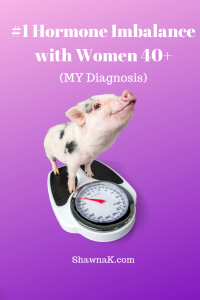So I’ve got it….
It’s called Hashimoto’s Thyroiditis. It sounds a little like something from Harry Potter without the whimsical magic 😉
What does my diagnosis has to do with you? Skim down to the ‘important for you’ bullets if you don’t have time to read this entire blog post…
I had some routine blood work done and found my TSH (thyroid stimulating hormone) was elevated. My doctor’s knee jerk reaction was to put me on a thyroid medication (synthroid).
While I have no problem using meds (if this is what I need), I wanted to be sure I needed them.
So we did more blood work with tests for free T3, free T4, Anti-TPO and Anti TG as well as ferritin (iron). Based on these results, it’s apparent that I have Hashimoto’s thyroiditis. This is an auto-immune disease where, for an inexplicable reason, my body is attacking my own thyroid. If left untreated, my ‘symptoms’ could worsen and could even lead to death.
Important for you: Typical Hashimoto symptoms (hypothyroidism) are:
 fatigue
fatigue- mental fog
- dry skin
- constipation
- depression
- weight gain
- hair loss
- inability to lose weight
- feeling cold
- fluid retention
- puffy face
- non-specific aches and stiffness in muscles and joints
- decreased sweating
- thick or brittle nails
- swollen hands and feet
- sleepiness
Left untreated, these signs and symptoms can increase in severity as the condition worsens.
For me, I have no symptoms. I ‘may’ be a little tired, but I’m just like you with many things on my plate, we just push through no matter what, right?
Important for you: If you feel any of these symptoms, make sure to get some blood work done. Ask for a blood test for TSH, free T3, free T4, Anti-TPO, Anti TG, ferritin. Make sure you feel comfortable with your doctor in discussing results.
**Don’t suffer through with the symptoms described just thinking they are simply menopausal symptoms. They ‘could’ be menopause, but quite likely, you’re suffering from hypothyroidism too. Women are 10-15 times more likely to suffer from hypothriodism than men and it’s the number one hormone imbalance in women over 40. There’s also a genetic pre-disposition for the condition, so if someone in your family suffers, it’s more likely that you will too.
There’s NOTHING you can do to prevent this condition. For me, it’s likely a genetic condition. My healthy lifestyle has possibly helped me manage on my own for a long time. I have no issues taking medication, but I will also do STILL do the things below to support my dying thyroid…
Important for you to support your thyroid:
- take a selenium supplement
- take a vitamin B supplement
- reduce or eliminate gluten completely
I’ll be on the look out for the conditions below which indicate OVER medication or hyperthyroidism.
Important for you to watch for hyperthyroidism:
- heart palpitations
- tremors, nevousness
- sweating
- restlessness
- weight loss
For now, I’ll have blood work done every 30 days to monitor my thyroid levels.
The good news is that there are few side effects of medication required to treat hypothyroidism, the only trick is getting the dosage right.The prognosis for treating Hashimoto’s is very positive. Here are a few tips to keep it under control:
Important for you tips:
- reduce processed food and sugar intake
- avoid excess caffeine usuage
- ensure you’re meeting Vitamin D & iron requirements
- maintain and/or increase lean muscle tone to keep your metabolism firing
- ensure that your nutrition plan includes a personalized balanced macros profile (carbs/fats/protein)
- have regular check ups with your doctor
If you need support, I’m here for you. I’m finding ways to off set age-related health issues. I’ve got answers. Start with this ‘master class‘




